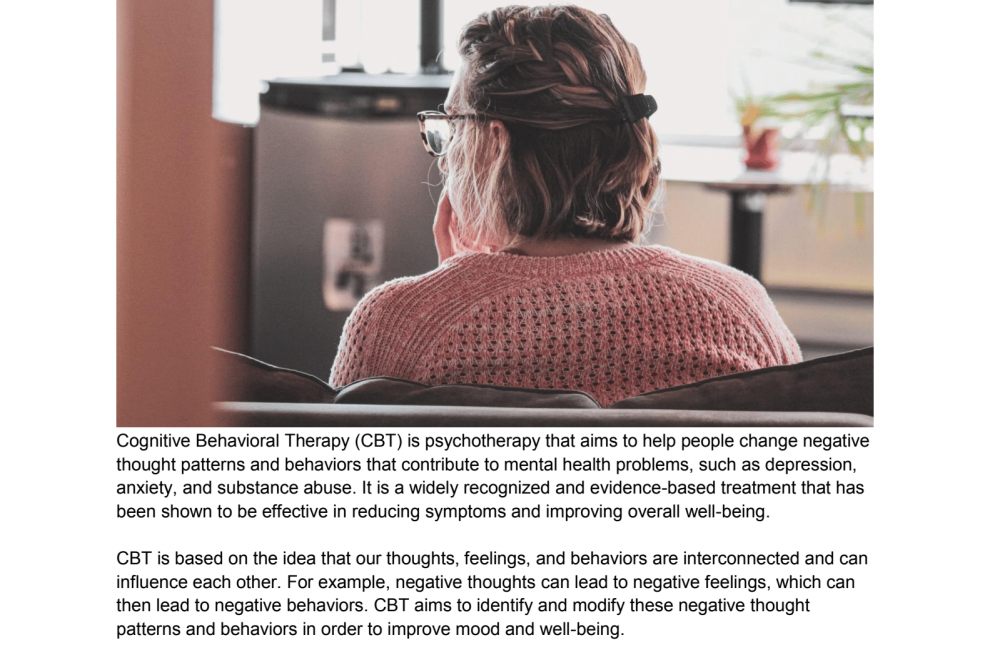Why CBT Therapy Can Be A Helpful Psychotherapy Tool
Cognitive Behavioral Therapy (CBT) is psychotherapy that aims to help people change negative thought patterns and behaviors that contribute to mental health problems, such as depression, anxiety, and substance abuse. It is a widely recognized and evidence-based treatment that has been shown to be effective in reducing symptoms and improving overall well-being.
CBT is based on the idea that our thoughts, feelings, and behaviors are interconnected and can influence each other. For example, negative thoughts can lead to negative feelings, which can then lead to negative behaviors. CBT aims to identify and modify these negative thought patterns and behaviors in order to improve mood and well-being.
The central principle of CBT to help depression is that our thoughts and beliefs have a direct impact on how we feel and behave. Therefore, by changing our thoughts and beliefs, we can change our feelings and behaviors. For example, if someone believes that they are not good enough or that they are constantly failing, they may feel anxious or depressed. By challenging and modifying these negative beliefs, the person can learn to feel more confident and capable.
CBT typically involves regular sessions with a trained therapist, who works with the client to identify and modify negative thought patterns and behaviors. The therapist may use a variety of techniques, such as questioning the evidence for negative thoughts, teaching relaxation techniques, and setting achievable goals.
CBT often involves homework assignments, in which the client practices the skills and techniques learned in therapy sessions in their daily life. This helps to reinforce the learning and allows the client to see the progress they are making.
CBT is a proven treatment for depression
CBT has been extensively researched and has been shown to be an effective treatment for depression in numerous studies. It has been found to be as effective as antidepressants (https://en.wikipedia.org/wiki/Antidepressant) in reducing symptoms of depression, and the benefits of CBT tend to be longer lasting than those of medication alone.
CBT is a collaborative treatment
CBT is a collaborative treatment, which means that the therapist works with the client to identify and modify negative thoughts and behaviors that contribute to the depression. This collaborative approach empowers the client to take an active role in their treatment and can lead to a greater sense of control and ownership over their own well-being.
CBT is focused on the present
CBT is focused on the present and the here and now, rather than on the past. This means that it doesn’t delve into deep-seated emotional issues or past traumas, which can be overwhelming and distressing for some people. Instead, it focuses on the client’s current thoughts and behaviors and how they can be changed to improve their mood and overall well-being.
CBT is a practical and action-oriented treatment
CBT is a practical and action-oriented treatment that teaches skills and techniques that clients can use to manage their depression on their own. It emphasizes the importance of taking small steps and making progress gradually, which can be more achievable and less overwhelming for clients who are struggling with depression.
CBT can be done in individual or group therapy
CBT can be done in individual therapy sessions or in a group setting with other people who are also struggling with depression. Group therapy can be particularly helpful for people who feel isolated or alone and may benefit from the support and camaraderie of others who are going through similar experiences.
CBT can be done in person or online
CBT can be done in person with a therapist or online through teletherapy. This can be particularly useful for people who live in rural or remote areas, or who have mobility or transportation issues. Online therapy can also be a convenient and flexible option for people who have busy schedules or who prefer the privacy and comfort of their own home.
In conclusion, CBT is a proven and effective treatment for depression that can be done in individual or group therapy, in person or online, and is focused on the present and the here and now. It is a collaborative, practical, and action-oriented treatment that empowers clients to take an active role in their own well-being and teaches skills and techniques that can be used to manage their depression on their own. For these reasons, someone should seriously consider pursuing CBT for depression.


















